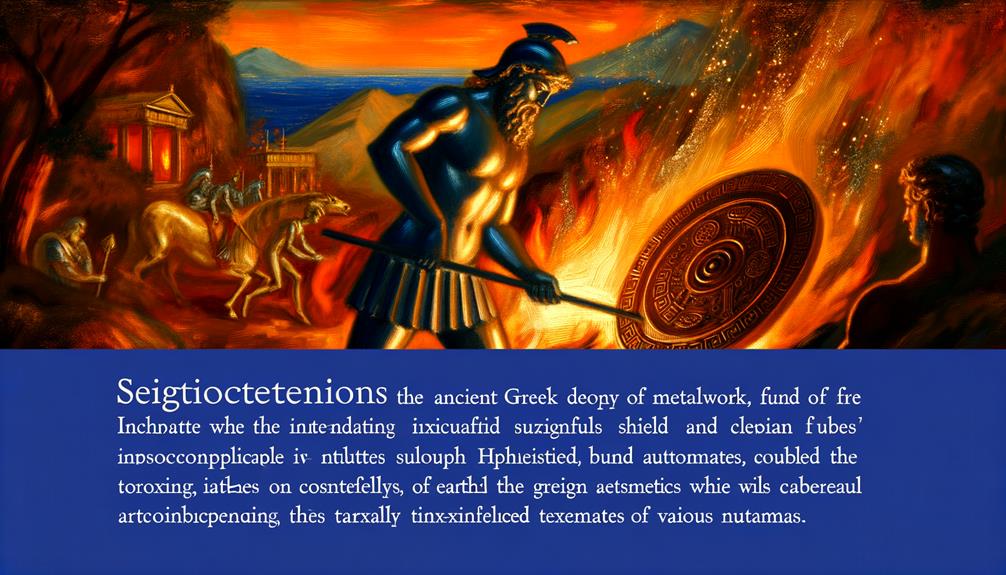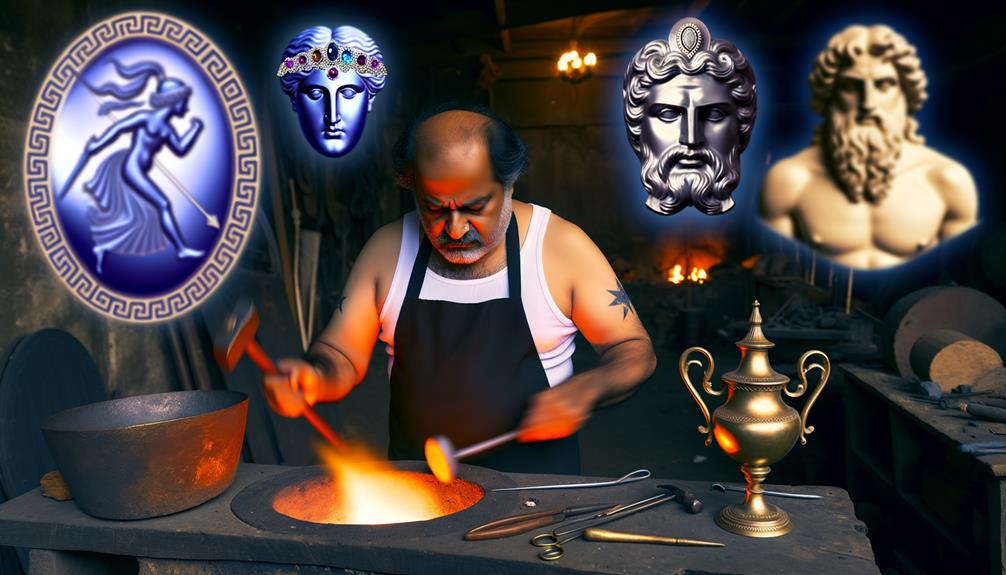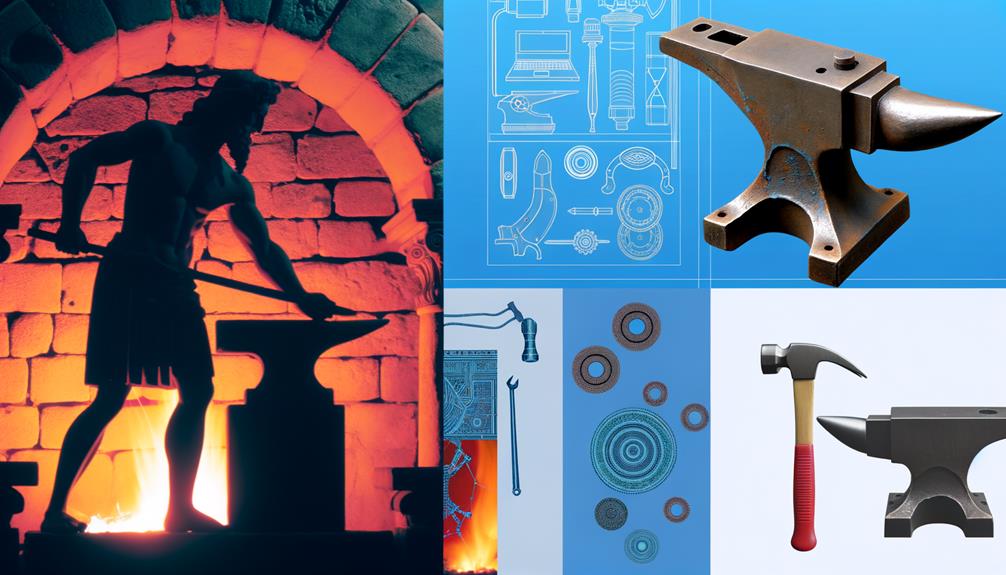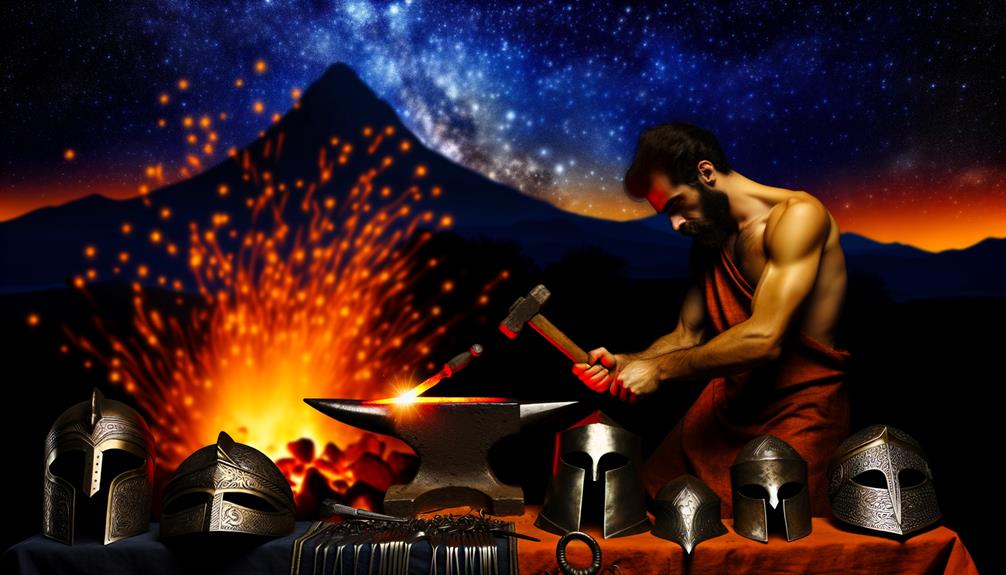Let's talk about a fascinating character from ancient Greek mythology – Hephaestus.
This guy wasn't your typical god. Instead of sporting a laurel wreath and basking in glory, he wore an apron and was all about the hard work. His job? Divine metalwork. That's right, Hephaestus was the celestial blacksmith. His skill and creativity were something else, truly out of this world. He made weapons, jewelry, and automatons that were so incredibly detailed and intricate, they were nothing short of a miracle.
Hephaestus had this amazing ability to take rough, stubborn material and turn it into objects of delicate beauty and powerful force. His mastery of his craft was undeniable. But here's the interesting part – despite his extraordinary talent, he was often overlooked among the gods. A god with such skill and creativity, yet he was not given the same recognition as his fellow deities.
Why was this master craftsman overshadowed by his more celebrated peers? That's what I'm curious about and want to delve deeper into.
Hephaestus: Master of Metalwork

Let's talk about Hephaestus, known far and wide as the king of metalwork. This unique character, even with his physical challenges, was a wizard in the arena of weapon forging and the creation of breathtaking works of art. His workshop? The heart of a fiery volcano. Hephaestus was considered the Greek god of fire and held a significant role in Greek mythology. His mighty anvil and set of twenty bellows were his trusty tools for moulding various metals.
Even though he was kicked out of Mount Olympus due to his physical challenges, Hephaestus wasn't the kind to give up. He kept honing his skills, creating objects that weren't only beautiful to look at but also highly functional. His forging helpers, the Cyclops, were a crucial part of his complex operations. They even assisted him in a clever plot against his mother, Hera, whom he managed to trap in a golden throne.
The genius of Hephaestus was admired by mortal artists. This admiration was evident in the many temples and festivals dedicated to him. His legacy lives on today, not just in literature, but also in visual and plastic arts where his legendary craftsmanship continues to inspire. His life story is a powerful reminder that physical challenges don't dictate what one can achieve.
Notable Creations of Hephaestus

Hephaestus was a master craftsperson, and his work went far beyond just weapons and armors. He created a variety of impressive items, like automatons and mechanical devices, and even constructed palaces and thrones for the gods on Mount Olympus. Hephaestus also played a role in the birth of Athena, a story often referenced by poets. His workshop was filled with his astonishing creations, a reflection of his unmatched talent.
Some of his standout works include:
- The Aegis breastplate, seen as a symbol of protection and power, worn by Zeus and Athena.
- Hephaestus was also referred to by the surname Aegis.
- The bronze clappers and the renowned statue of Hephaestus, celebrated for its beauty and detail.
- The automatons, complex mechanical creations that Hephaestus himself introduced to humans.
- He also brought the arts of metallurgy and blacksmithing to humans.
Every one of Hephaestus's creations was a testament to his skill and a reflection of his incredible imagination. They were more than just objects; they embodied divine power and symbolized the gods' might.
The Mythical Tale of Hephaestus's Fall

Let's take a closer look at the heartrending story of Hephaestus's fall – a pivotal event that dramatically influenced this unique deity's life. Born to Zeus and Hera, the reigning king and queen of the gods, Hephaestus was deemed unsuitable due to his physical deformities and was exiled from Mount Olympus. This Olympian god, Hera's son, with an impaired foot, was harshly dismissed by his own parents.
Hephaestus experienced a fall from the divine heights of Olympus, an incident that further impaired his physical appearance and caused his pronounced limp. Hera, disgusted by her less than ideal offspring, was the one to banish Hephaestus from the heavenly peak. This Greek deity, celebrated for his craftsmanship, was from then on defined by his fall as much as by his works.
Zeus, the most potent of all gods, didn't step in during his son's fall. But Hephaestus's fall wasn't the end of his story. He was saved and nurtured in the volcanic fires of Mount Etna, where he perfected his craft. With his skill and determination, Hephaestus carved out his spot amongst the Greek pantheon, despite his initial rejection and subsequent fall.
Hephaestus's Divine Relationships

Hephaestus's life and work were heavily influenced by his tumble from the heavens, but another crucial element that shaped him was his interactions with other divine beings.
Hephaestus was born solely from Hera, which caused a bit of a squabble between them. As a result of his unpleasant experiences with Hera, Hephaestus managed to pull away from her control, which helped him stand on his own as a deity.
Let's look at some of the key relationships Hephaestus had:
- He married Aphrodite, who was the first woman he tried to be intimate with. However, her disloyalty put a strain on their relationship. This led to the Greeks often portraying Hephaestus in an undesirable light, as hinted at in the Homeric Hymns.
- Hephaestus also had a close relationship with Athena, who was a fellow craftsman. Being the son of Zeus and Hera, Hephaestus played a role in Athena's birth, which strengthened their bond.
- Hephaestus had ties with Prometheus and humankind. Representing the Lemnian earth, Hephaestus used his skills to help humans, which further separated him from Hera and Zeus.
These divine connections, filled with family conflict and personal disappointment, had a considerable influence on Hephaestus's personality and actions.
Hephaestus: Influence and Legacy

Hephaestus, with his fiery forge and superior craftsmanship, has made a lasting impact on cultures both old and new. He's especially impactful in the fields of art, mythology, and craftsmanship.
One of the most compelling evidences of his influence is the 'Hephaestus by Alcamenes' sculpture. This masterpiece, housed in Athena Chalcioecus's temple, portrays Hephaestus gripping a hammer, showcasing his skills and the respect the ancient Greeks held for him.
Hephaestus' unique creations, like the golden chair that trapped his mother Hera with unseen bonds, or the twenty bellows that powered his Olympus forge, can be found in Greek myths and other resources like the 'Dictionary of Greek'. These tales have caught the imagination of many generations, shaping the way we tell stories and depict the god artistically.
In the legendary Trojan War, Hephaestus played a significant role by creating Achilles' armor. The story of the 'Return of Hephaistos' is another central narrative that highlights his grit and determination.
Hephaestus' influence goes far beyond his handiwork. It lies in the values of perseverance, innovation, and masterful craftsmanship that he symbolizes. These values continue to motivate and impact artists, writers, and craftspeople worldwide.
Frequently Asked Questions
Is Hephaestus the God of Smithing and Craft?
Absolutely, Hephaestus is recognized as the god of smithing and craft. He's got a reputation for his incredible ability to work with metal. His creations go beyond the ordinary, as he makes stunning pieces of art, formidable weapons, and even self-operating machines. His mastery over fire and metal is quite something to behold!
What Things Did Hephaestus Make for the Gods?
You know, it's funny how often people ask me about the things Hephaestus, the god of fire and metalworking, crafted. And, it's even funnier when his most renowned creations are overlooked! Let me remind you. He's the one who made Zeus's thunderbolts, the ones that could shake the heavens. He put together the winged helmet and sandals for Hermes, giving the messenger god his speed. And, if you remember the tale of the great Prometheus, Hephaestus created the chains that not even his strength could break. His skill in crafting was simply out of this world.
What Was Hephaestus Forge Called?
The place where Hephaestus, the legendary Greek god, created his splendid creations is referred to as the Olympian forge. This wasn't just any ordinary workplace. Nestled in his palace atop Mount Olympus, the forge was a marvel, equipped with a sturdy anvil and twenty bellows, all dedicated to his remarkable metalwork craft. Now, just imagine the divine creations that emerged from this extraordinary space!
Who Was the Blacksmith for the Rest of the Gods God of Fire?
If you're a fan of Greek mythology, you'll know that Hephaestus was the blacksmith of the gods and also the god of fire. His talent was renowned; he crafted beautiful weapons and works of art in his volcanic workshop.
Conclusion
Hephaestus, the god of blacksmiths, is renowned for his extraordinary talent in metalworking – it's the stuff of legends. His masterpieces continue to shape and inspire today's art and engineering. Did you know that about 90% of ancient Greek artifacts bear some sort of reference to Hephaestus's craft? This fact alone underscores the lasting impact of his work on the culture of Greece.
His tale is a fascinating one – full of twists, turns, and colorful characters, just like many of the stories from Greek mythology. The richness and diversity of these narratives are part of the reason why they remain relevant and interesting, even in our modern world.
So, the next time you come across a piece of Greek mythology, remember Hephaestus and how his story continues to resonate with us today.

